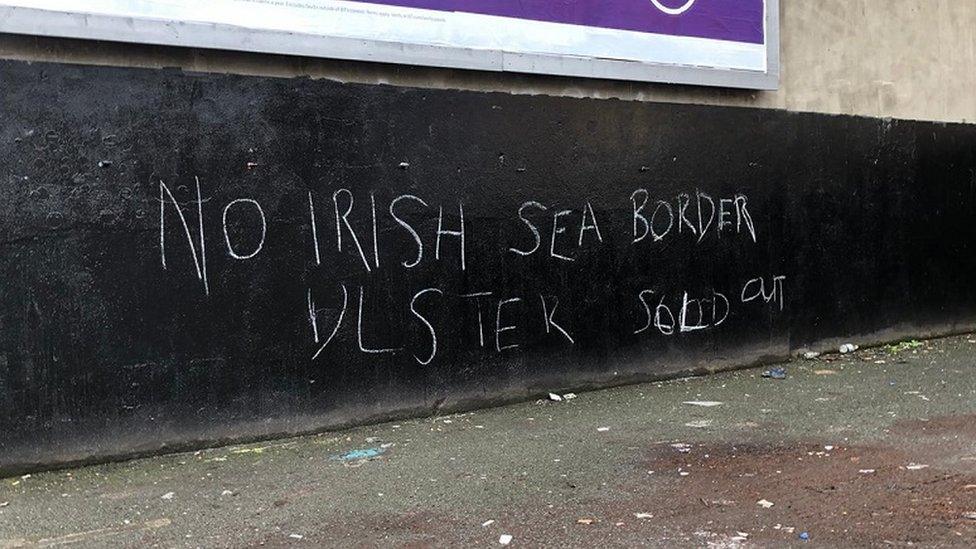DUP: Naomi Long warns of instability around first minister move
- Published
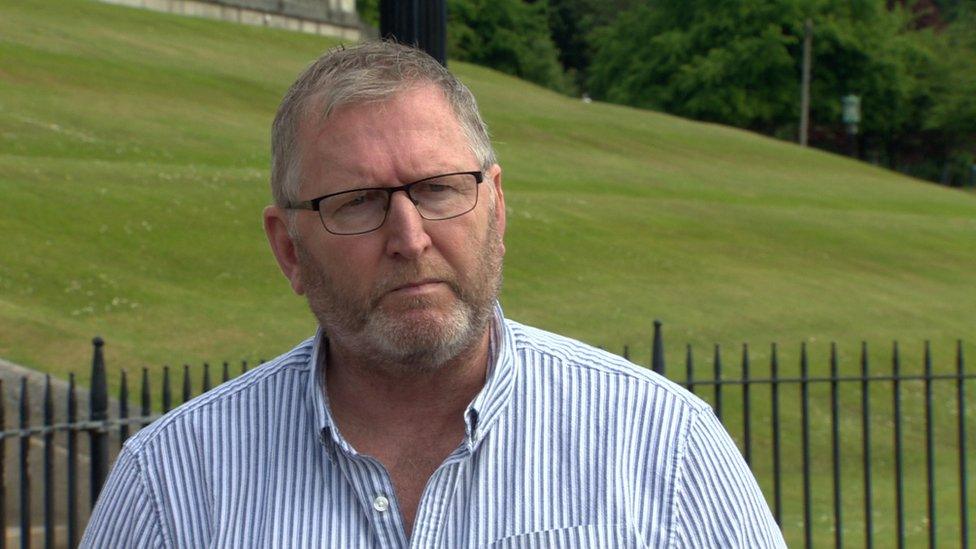
Doug Beattie says DUP and Sinn Féin need to be clear and generous with each other
The Ulster Unionist and Alliance parties have warned of potential political instability sparked by the appointment of a new first minister.
UUP leader Doug Beattie said "dithering" would lead to more "factious cracks" in the executive.
Justice Minister Naomi Long said instability within the DUP could be reflected in the political institutions.
Edwin Poots said he will announce his ministerial line-up when he is ready.
Arlene Foster said she would step down as first minister when that happens.
Her resignation will trigger a seven-day countdown for the roles of first and deputy first ministers to be filled.
Mr Poots has said he had received no "ultimatum" from Sinn Féin about issues that it wants to see dealt with before the party supports nominations for first and deputy first ministers.
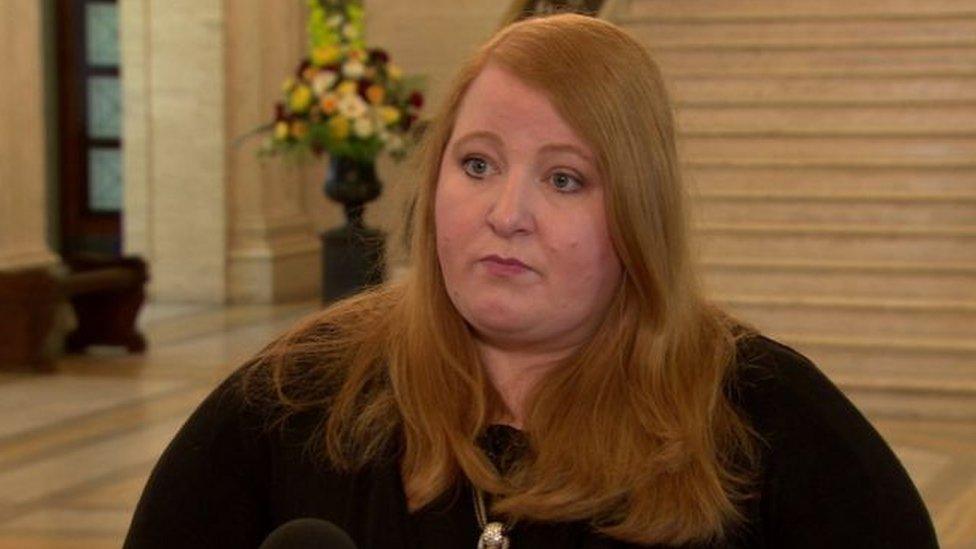
Naomi Long says any changes at Stormont creates instability
But Deputy First Minister Michelle O'Neill said there could be no "stepping back" on commitments made under the New Decade, New Approach, external deal which restored devolution in January 2020.
Ms O'Neill said Irish language legislation was a key component of that deal and delivery of it needed to be made before the end of the assembly mandate.
Mr Beattie urged the parties to be generous and clear with one another to avoid collapsing the executive.
"Any dithering ... would create more factious cracks in the Northern Ireland Executive and we don't need that," Mr Beattie said.
Mrs Long said there were concerns about what was happening and that "any changes at Stormont obviously creates the opportunity for instability".
"There are the opportunities first of all to see instability within the DUP itself reflected in instability in the institutions," Mrs Long told the BBC's Good Morning Ulster programme.
"We still haven't had a new first minister appointed - that's another opportunity for instability and I think all of us are just now awaiting what's going to happen on that front."
It is understood that the new DUP leadership would like to see Mrs Foster host a British-Irish Council meeting on 11 June before she leaves office.


It's certainly been highly dramatic in the past week.
Naomi Long is not wrong when she says the appointment of a new first minister offers an opportunity for instability.
The minute Edwin Poots announces his new ministers, Arlene Foster says she will resign.
That gives him seven days to get a new first minister appointed and there are no guarantees about that.
Sinn Féin hold the whip hand and can block that, if they so wish, because they have to elect a deputy first minister in the joint office.
The Irish language act could hold a big question in the future of devolution.

SDLP leader Colum Eastwood said people should "not be obsessed with what is going on within the DUP".
"I frankly don't care who the first minister is," he said. "I want them [Sinn Féin and the DUP] to get down to business, sort out the [health service] waiting lists, deal with the economic problems that we have, and get on with it."
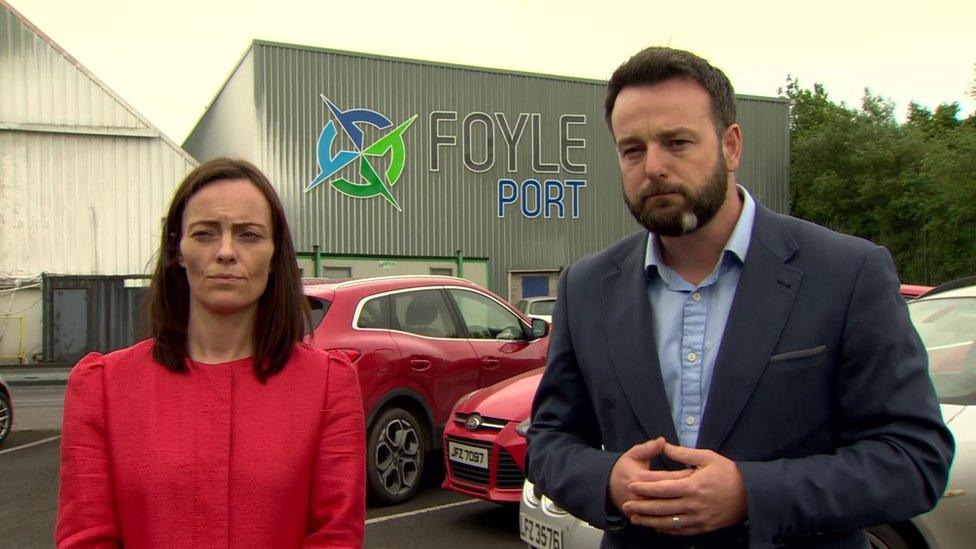
SDLP leader Colum Eastwood says people should "not be obssesed with what is going on within the DUP"
Ahead of a meeting of the Stormont party leaders' forum on Thursday, Mr Poots said it was "vital there is dialogue and a common purpose to work together in the interests of everyone".
"This meeting can provide a useful opportunity to ensure there is a smooth transition to changes within the Executive team and also to ensure our focus is on the matters of most importance to the people we all represent," he said.
"It is an opportunity for us to affirm the commitments in New Decade, New Approach to operate the political institutions on the basis of good faith, trust and mutual respect and reaffirm our commitment to the principles of power-sharing and cross community protection as contained in the Belfast Agreement."
But the DUP was criticised on Wednesday afternoon by Communities Minister Deirdre Hargey for not attending a meeting of ministers from Belfast and Dublin.
The DUP is boycotting some North-South Ministerial Council (NSMC) meetings due to its opposition to the NI Protocol.
Sinn Féin assembly member and Communities Minister Deirdre Hargey said on Wednesday night that she had "asked for legal advice on a judicial review against ministers who refuse to attend north-south ministerial meetings".
She said the meetings were an "integral part of the political institutions of the Good Friday Agreement alongside the Executive and the Assembly" and "need to be functioning properly with ministers from all parties attending".
Last week, SDLP assembly member and Infrastructure Minister Nichola Mallon said she had sought legal advice over the DUP's absence at north-south meetings.
Allow X content?
This article contains content provided by X. We ask for your permission before anything is loaded, as they may be using cookies and other technologies. You may want to read X’s cookie policy, external and privacy policy, external before accepting. To view this content choose ‘accept and continue’.
Meanwhile, Mrs Long said it was important that politicians in Northern Ireland engaged with loyalists but she warned that should not mean speaking to "loyalist terrorists".
It comes after DUP MP Ian Paisley said that there was "a direct outreach programme being undertaken under the direction of the new leader", external between the party and loyalists.
"If by loyalist you meant people who are loyalist in their views, I don't have a problem with that," she said.
"I think everyone deserves an opportunity to have an influence over what happens in society but if by loyalist it's code for loyalist paramilitaries then of course I have a problem.
"My issue is with those is that maintain paramilitary structures, coercive control in the community and all those negatives of paramilitarism and terrorism and still have a seat at the table."
'Pretty sinister'
The DUP leadership under Arlene Foster previously held talks with the Loyalist Communities Council (LCC), the organisation which represents loyalist paramilitary groups, including the Ulster Defence Association (UDA) and the Ulster Volunteer Force (UVF).
Last week, Mr Poots' rival for the DUP leadership, Sir Jeffrey Donaldson, said that one member of his team had been threatened by someone from the UDA.
It is believed the threat was made online during the leadership campaign.
Ms Long said politics in Northern Ireland felt like "a soap opera" at the moment and the closer to an election the Northern Ireland Assembly gets, the harder it would be to implement Irish language legislation before the summer recess.
The New Decade, New Approach deal contained commitments on health, language, legacy and the environment.
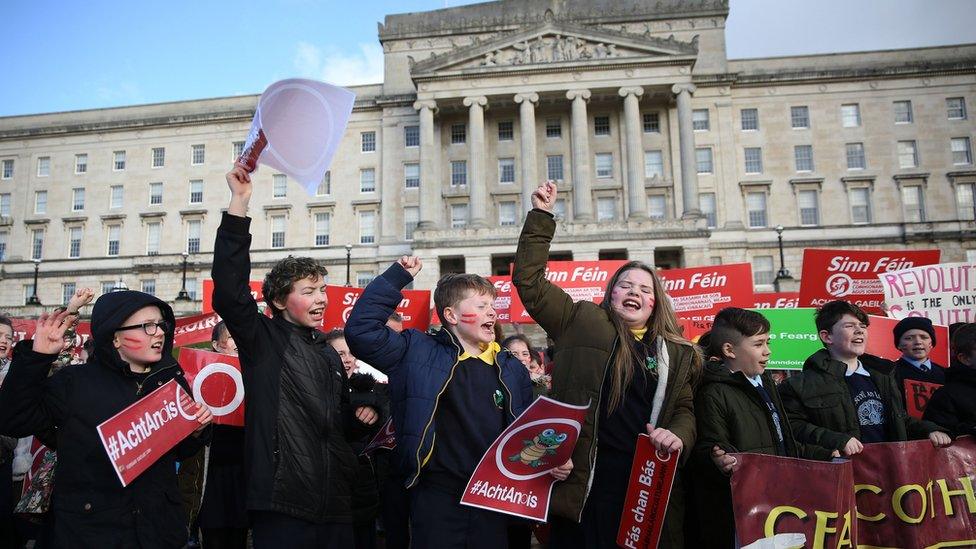
Irish language campaigners have held several protests outside Stormont
It committed the parties to establishing an Office of Identity and Cultural Expression, which would put in place provision for services in Irish and Ulster-Scots.
Through the office, new Irish and Ulster-Scots commissioners to enhance and develop the languages were to be appointed as well, although those processes have yet to take place.
Irish language activist Ciarán Mac Giolla Bháin, from the group Dream Dearg, said there were "serious concerns" about the act not becoming law.
"There is a need for a clear statement from Edwin Poots on this to make clear this will be in his current mandate and we need to move on," he said.
"The legislation itself has already been drafted so there's absolutely no justification for delaying this in any way."
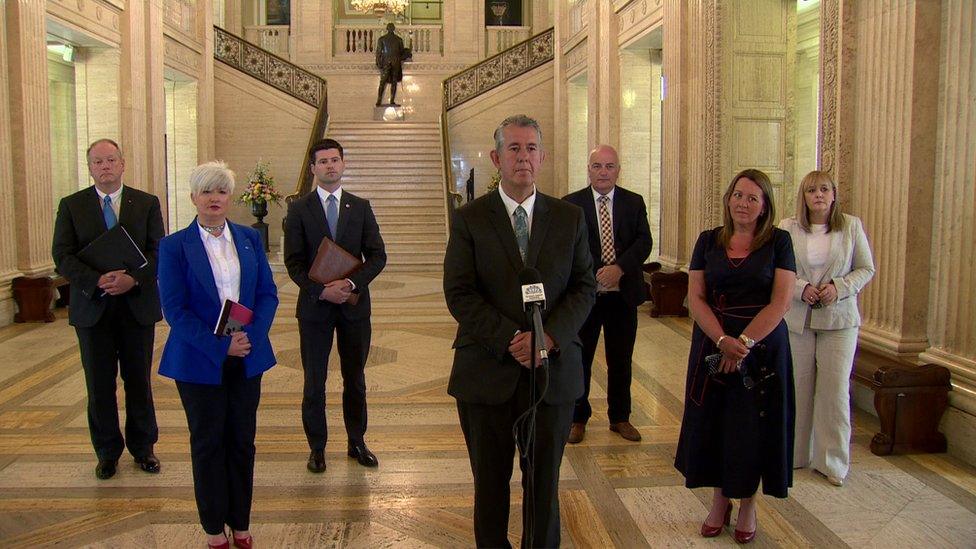
Edwin Poots spoke to the media on Tuesday flanked by his new backroom team of DUP MLAs
On Tuesday, the new DUP leader said he would announce his ministerial line-up "when ready".
In an interview with the BBC on Sunday, Mr Poots said he shared the fear of his predecessor Arlene Foster that anger over the Northern Ireland Protocol could lead to violence on the streets this summer.
Mrs Long said she was "sympathetic to those who are angry about the protocol, to those who see it as a barrier between GB and Northern Ireland".
"I didn't want to see a border in the Irish Sea or on the island of Ireland because I actually think those borders and boundaries are a disrupter to our ability to do what we have been doing in terms of the economy," she added.
"We didn't support the protocol but the protocol is now the law and I believe in upholding the law, that shouldn't be a surprise to anyone."
- Published1 June 2021
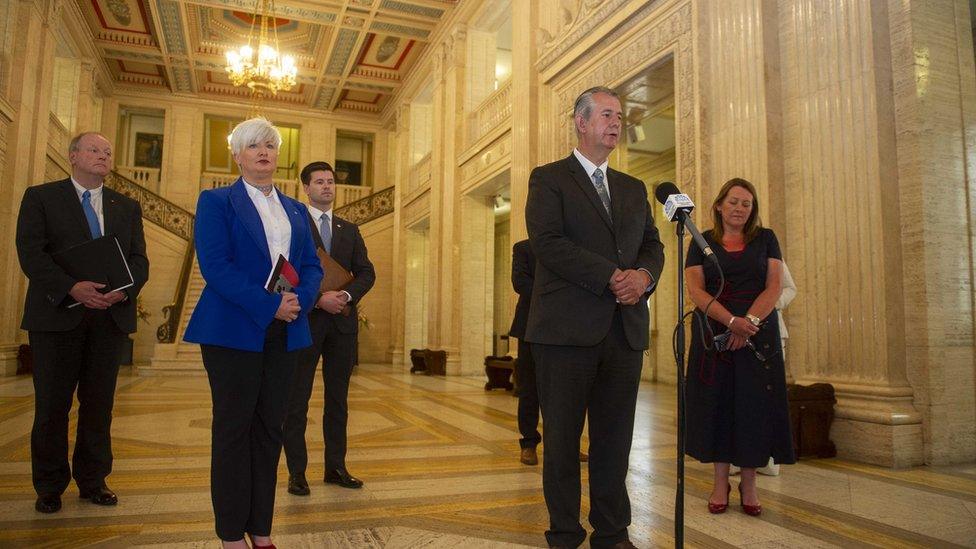
- Published26 February 2021
